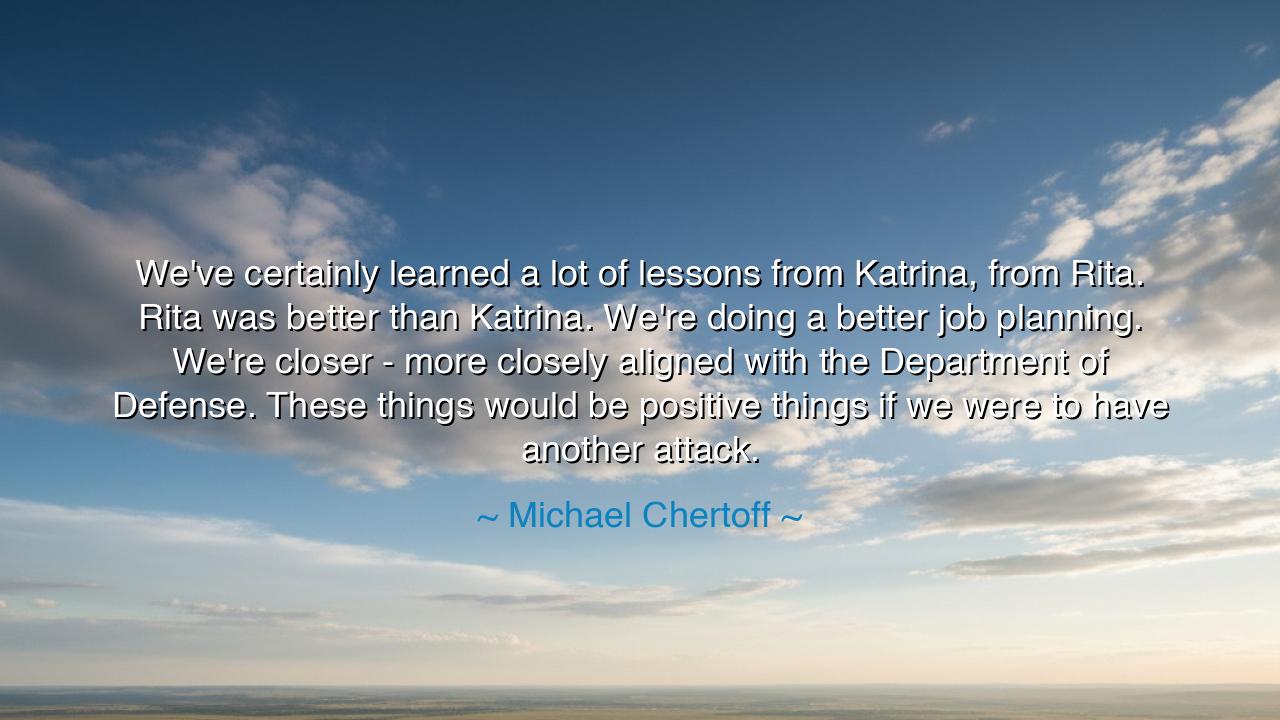
We've certainly learned a lot of lessons from Katrina, from
We've certainly learned a lot of lessons from Katrina, from Rita. Rita was better than Katrina. We're doing a better job planning. We're closer - more closely aligned with the Department of Defense. These things would be positive things if we were to have another attack.






The words of Michael Chertoff — “We’ve certainly learned a lot of lessons from Katrina, from Rita. Rita was better than Katrina. We’re doing a better job planning. We’re closer — more closely aligned with the Department of Defense. These things would be positive things if we were to have another attack.” — are not merely the remarks of a statesman, but the testament of a civilization awakening to its own fragility. Here we see sorrow transmuted into wisdom, calamity reshaped into vigilance. For in the crucible of disaster, man is tempered like steel, forged stronger by the flames of trial.
Hurricane Katrina was not merely a storm; it was a mirror held up to the mightiest nation, revealing weakness, discord, and unpreparedness. Thousands perished, and countless more were left adrift in despair, while leaders faltered in confusion. Yet from this abyss of failure came remembrance — the bitter memory that would serve as a guidepost. When Rita followed, the blows were lighter, the response swifter, for men had listened to the lessons carved into the ruins of New Orleans. Thus Chertoff speaks of progress, of a people learning to harness discipline against chaos.
History itself teaches that calamity is often the fiercest tutor. Recall the sack of Rome by the Gauls in the fourth century before Christ: the Eternal City humiliated, its temples violated, its streets aflame. From that ruin the Romans swore never again to be caught unready. They built walls, disciplined their legions, and forged a republic whose iron will would one day rule the known world. So too, America, struck down by storms and failures, must find in hardship the seeds of renewal.
The words of Chertoff also bear warning. He speaks of being aligned with the Department of Defense, not merely against the wrath of nature, but against enemies who might strike from without. The ancients would call this preparedness of the polis — the vigilance of the city-state that must forever stand watch upon its walls. For fate rarely gives warning, and when peril comes, those who are ready endure, while those who sleep are devoured.
Let the generations remember: calamity is not only ruin, but a herald of wisdom. To stumble once is human; to stumble twice is folly. Therefore, let disaster not be in vain. When the winds rise, when the waters break, or when enemies plot in shadow, let us be as the oak — battered by storms, but with roots driven deeper into the earth. In this way, the words of Chertoff remind us that even the darkest storms leave behind a light: the light of preparation, of strength, and of the will to endure.






NMNgoc Minh
While Chertoff’s point about improvement in planning is valid, how much progress have we really made when so many people still face the consequences of past disasters? Is it enough to just ‘do a better job planning’? How do we ensure that the lessons learned are not just theoretical but actually applied in real ways to help those who are most vulnerable in future catastrophes?
VALuyen Viet Anh
Chertoff’s statement reflects a level of confidence in the progress made since Katrina and Rita, but can we truly say that we’ve done enough? The emphasis on being ‘closely aligned with the Department of Defense’ seems to prioritize military readiness over community-centered recovery. Shouldn’t disaster response involve more than just military involvement—what about local communities, resources, and sustainable long-term recovery plans?
HNHeo Nguyen
While it's reassuring to hear that lessons have been learned from Katrina and Rita, does this comment overlook the long-term impact these events had on communities? Planning and preparation are important, but how do we address the underlying social and economic vulnerabilities that were exposed by these disasters? Can improved planning truly replace the need for systemic change in disaster response and recovery?
CDbanh thi cho dai
It’s interesting that Chertoff sees Rita as a ‘better’ disaster compared to Katrina, but can we truly compare two such devastating events? How does framing one disaster as a ‘better’ experience shift the focus from the real issues that people face in the aftermath of these events? Shouldn't we be asking why these storms caused so much destruction in the first place, instead of focusing on future preparedness?
KDKieu Diem
Michael Chertoff’s comment about the lessons learned from Hurricane Katrina and Rita seems to focus on improvement, but it also raises concerns. Are we really prepared for future disasters, or are we merely patting ourselves on the back for making incremental progress? What about the lives lost during these disasters? Shouldn't we focus more on preventing these kinds of events rather than just being ‘better prepared’ for the next one?